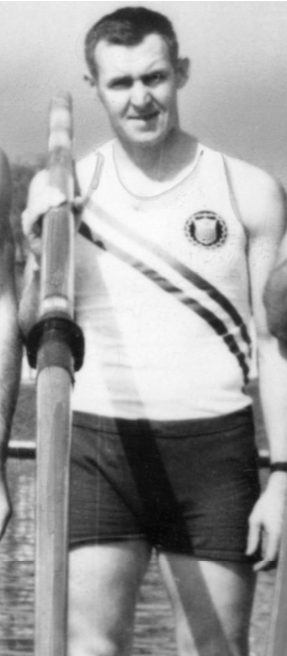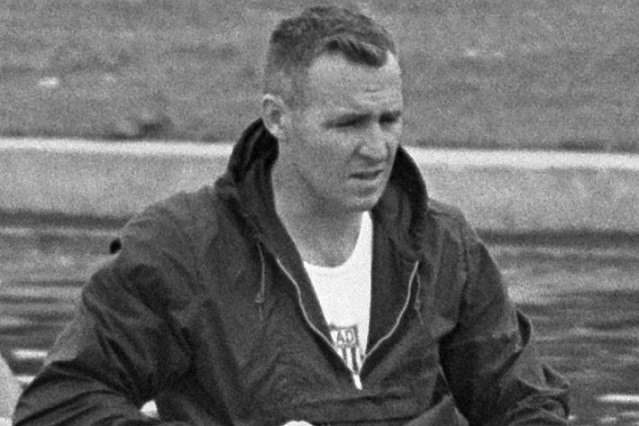Bill Knecht
Rowing
Legendary Olympic gold medal-winning rower
 |
In the history of rowing, virtually every American eight-oared crew that reached the Olympics was composed of college students with little responsibility except to train. So, it seems astonishing that a man in his mid-30s, with six children and a business to run, would reach the heights of Olympic victory.
If anything, Bill Knecht was a determined, focused athlete. Tireless training, finely honed skills and a passion for competition had garnered him numerous national and international medals since first stepping into a shell as a student at Philadelphiaââ¬â¢s La Salle College High School in 1946.
But he knew at age 34 that the 1964 Tokyo Olympics might be his last run for gold.
Dietrich Rose, a coach for that historic Vesper Boat Club crew, said of Knecht, who was 6 feet tall and 200 pounds: ââ¬ÅHe wasnââ¬â¢t a huge guy, but a technique guy. He knew how to enter the water perfectly. You didnââ¬â¢t have to tell him anything.ââ¬Â�
ââ¬ÅWhile [Knecht] didnââ¬â¢t look like much of a physical specimen, a barrel of a man, he was certainly a heavyweight,ââ¬Â� wrote crewmate Emory Clark in his book, Olympic Odyssey. ââ¬ÅLooks can be deceiving though, as he was, among other things, the best pure oarsman in the club.ââ¬Â�
Training for Tokyo was grueling. ââ¬ÅWe rowed six days a week in all kinds of weather, and we killed ourselves,ââ¬Â� wrote Bill Stowe in All Together. ââ¬ÅWhen we were not rowing, we weight-lifted ââ¬â� tortured our bodiesââ¬Â¦We greeted the sun in the morning and put it to bed in the evening.ââ¬Â�
After days like thisââ¬âwith Knecht going to work in the middle of each dayââ¬âheââ¬â¢d come home and devour a half-gallon of vanilla ice cream, remembers his son Bill Knecht Jr. ââ¬ÅYou could say he had tremendous energy,ââ¬Â� his son allows. It was an energy that he would pour into rowing throughout his lifetimeââ¬â� both on and off the river, at home and abroad, inspiring individuals and organizations alike,
Knecht was 16 in 1948 when he joined the Vesper Boat Club. At Villanova University, he raced to a slew of national medals. He stroked the Vesper eight to a gold medal at the Pan American Games in 1955. The following year, Knecht and his longtime double sculls rowing partner John B. Kelly, Jr., won Pan Am gold. The two sought a repeat at the 1960 Rome Olympics, but sickened by an illness, they came in fourth in preliminary races. Knecht raced again at the 1963 Pan Am Games, again winning gold in the double.
AAA Perfect Replica Watches Store UK - Swiss Made Fake Watches Online:
Swiss Made Fake Watches
The place for replica watch discussion:
No.1 Swiss Replica Watches UK Site
Luxury Swiss Replica Watches UK:
replica omega
But high winds delayed competition in 1964 in Tokyo and it was nearly nightfall when the eight-oared crews took to the water. The field was formidable: the Soviet Union, Yugoslavia, Czechoslovakia, and Germany, noted for its rigorous all-body training regimen. Knecht was in the critical seat behind the stroke, precisely mirroring his rhythm and relaying it to the six men behind him. With 500 meters still to go, flares suddenly lit the course, but the oxygen-starved Vesper crew thought they were fireworks, celebrating another teamââ¬â¢s victory. But soon they heard their coxswain, a Hungarian refugee, yelling, ââ¬ÅYou are vinning!ââ¬Â� And they won, beating Germany by six seconds for the gold medal.
ââ¬ÅBill maintained his cool throughout,ââ¬Â� remembered teammate Stan Cwiklinski.
Knecht and the Vesper crew were quickly elected to the National Rowing Hall of Fame, but Knecht had more of himself to give to rowing. ââ¬ÅHis dedication to promoting the sport of rowing was tireless,ââ¬Â� said Laura Knecht, one of his nine children. ââ¬ÅHe encouraged many to get involved and stay involved, from referees to athletes.ââ¬Â�
Over the next 28 years, before his untimely death at age 62 in 1992, Bill Knechtââ¬â¢s achievements included founded the National Rowing Foundation; managing the US team in several world championships; served as president of the National Association of Amateur Oarsmen (now US Rowing); and was the only American to serve on the World Rowing Federation (FISA) Umpiring Commission for two decades.
Back home, Knecht fulfilled his dream of turning Camdenââ¬â¢s Cooper River into a national rowing course. ââ¬ÅIf it wasnââ¬â¢t for him, there wouldnââ¬â¢t be rowing there,ââ¬Â� said Al Wachlin, a former Commodore of the Schuylkill Navy. Knecht, he said, poured his own money into dredging, setting up docks, and more to create a fair, straight six-lane course which annually hosts the Intercollegiate Rowing Association races.
Collegiate rowers also travel to the Camden County Boathouse each spring to compete in the three-day Knecht Cup Regatta, which honors Bill Knecht and all that he did for rowing.
--Dotty Brown
 |